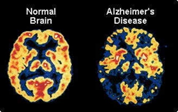Alzheimer’s Disease
August 29, 2016 01:00 AM
 Alzheimer’s disease is a form of dementia where brain cells die. Dementia is when you gradually lose your memory. Usually people who suffer from Alzheimer’s disease tend to lose their more recent memory and retain their long term memory. They will remember all about when they were young and where they grew up. They might forget who their more recent caregivers are or where they currently live. Alzheimer rates increase with age. If you know someone who suffers from Alzheimer’s disease, you can appreciate the frustration that goes along with this disease. Sometimes Alzheimer patients will get a glimpse of clarity for a short while and then go back to their debilitating state.
Alzheimer’s disease is a form of dementia where brain cells die. Dementia is when you gradually lose your memory. Usually people who suffer from Alzheimer’s disease tend to lose their more recent memory and retain their long term memory. They will remember all about when they were young and where they grew up. They might forget who their more recent caregivers are or where they currently live. Alzheimer rates increase with age. If you know someone who suffers from Alzheimer’s disease, you can appreciate the frustration that goes along with this disease. Sometimes Alzheimer patients will get a glimpse of clarity for a short while and then go back to their debilitating state.
I have a patient whose husband has Alzheimer’s disease. She tells me what she has to go through to take care of him. His personality has completely changed and he makes unreasonable requests which takes a toll her health.
Alzheimer’s disease not only affects the person with the disease but it especially affects their caregivers. One of the hardest things to witness is when your loved one no longer recognizes you and becomes a different person.
 The cause of Alzheimer’s disease is not well understood. There is a genetic link but because our genes are influenced by our environment, we should not surrender to our genetic predisposition. Alzheimer’s Disease is often coined Type 3 Diabetes due to the link of high blood sugar to dementia.
The cause of Alzheimer’s disease is not well understood. There is a genetic link but because our genes are influenced by our environment, we should not surrender to our genetic predisposition. Alzheimer’s Disease is often coined Type 3 Diabetes due to the link of high blood sugar to dementia.
Risk factors for Alzheimer’s disease are: head injuries, advanced age, smoking, hypothyroidism, low educational attainment, high blood sugar and cardiovascular disease. Some more controversial risk factors include: zinc deficiency, depression, aluminum exposure and stress.
The following have been shown to be protective against Alzheimer’s disease: a vegetarian diet and good fats, adequate vitamin and mineral status and mental and physical exercises.
Dr. Perlmutter is a neurologist who specializes in dementia. His top 4 suggestions for anyone wanting to prevent and decrease mental decline are:
- Eliminate sugar and excess carbohydrates (causes inflammation)
- Eliminate gluten (causes inflammation and affects the immune system as well as the brain)
- Eat more vegetables and good fats (fish, nuts, seeds, omega 3 fish oil, olive oil and coconut oil) – minimum of 1000 mg of DHA omega 3
- Exercise (15-20 minutes of aerobic exercise plus proper weight training each day) – this will increase the size of your brain’s memory centre and regenerate brain cells; doing brain exercises like crossword puzzles and Sudoku. Luminosity.com has 1000s of games to work your brain muscle.
As a naturopathic doctor, I strive for prevention so that we can age gracefully and have a good quality of life. If you have any questions about how I can help, do not hesitate to call the clinic.